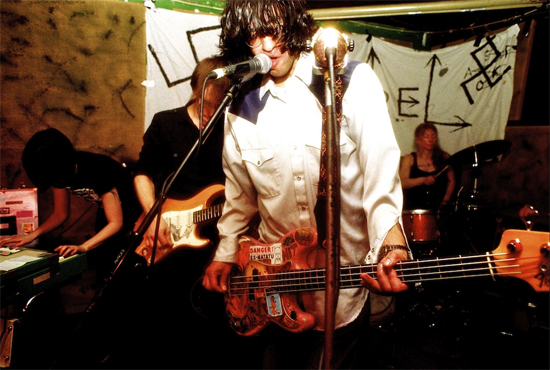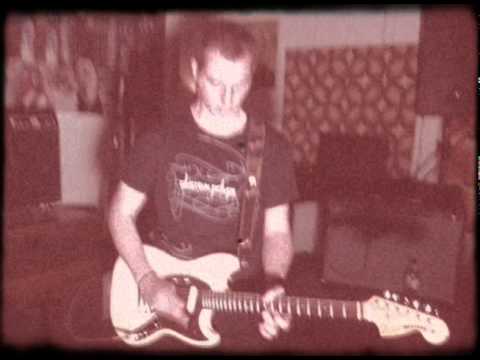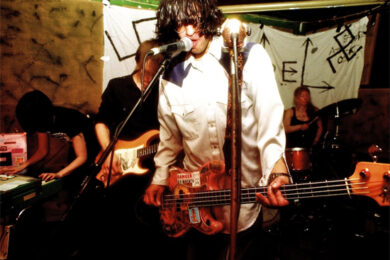Having overseen live mixing duties for some of most significant melodic noise bands of recent times, The Bent Moustache’s second album, Pastures New Seasons Turn, sees veteran soundman Ajay Saggar unleash his own musical vision and return to the stage. Although his name may be unknown to most gig goers, chances are if they saw My Bloody Valentine at ATP, Dinosaur Jr or Kurt Vile (among others), then they’ve already experienced his work in action. These mixing skills, along with his personable abilities as a tour manager, have kept him in demand for nearly 20 years.
Now employed as production manager at legendary Amsterdam venue, The Paradiso, Ajay’s musical life started in Preston in the late 80s with gonzo post-punk outfit The Dandelion Adventure. After moving to the Netherlands in the 90s, this continued with the abrasive, dub-based sound collages of Donkey, who retained a British identity with his sardonic, English vocals. As well as sharing a certain cavalier bass player, both bands live on in the footnotes of musical obscurity, each having left behind a pair of albums and recorded a John Peel session.
My personal history with Ajay goes back to when aged 18, I was struck by seeing The Dandelion Adventure, the weirdest group of Banana Split characters with twin-drummer-attack this side of the Butthole Surfers. Leaping offstage came this tall Asian dude with a knee-slung bass, who kept playing whilst flat on his back at the audience’s feet. They just had to be in my fanzine and we’ve since kept a correspondence going – whether with Donkey at London’s Guided Missile club, as tour manager for Sebadoh or sound engineering for various touring bands at ATP festivals (see his Soundation website to view the 50-plus acts he’s worked with).
Two years ago as their semi-official photographer, I joined up with version two of The Bent Moustache in Iceland, where they had been invited to play Aldrei fór ég suður; a festival held in Ísafjörður, in the country’s north west. Although they were one of only two foreign bands playing (the other came from the Faroe Islands), Ajay is an honorary Icelandic musician following years of touring with múm and Seabear. It was while speaking to múm’s Gunnar Örn Tynes, about his admiration for the tea-drinking British mannerisms of our Dutch-speaking mutual friend of Indian origin, that I appreciated Ajay’s truly global perspective.
Pastures New Seasons Turn is similarly unique. Opening track, ‘Skip a Breath’, is a driving pop song with epic strings and dream-like layering of guitars with male / female vocals that’s reminiscent of many of the guitar based bands he’s mixed with. Over the course of the album there’s killer riffs (‘Seine Meine Geheime Code’), dancing horns (‘Loose Thinking Now’) and a certain wilfulness not to make everything easy (‘The Sound of Sirens’). Pastures New Seasons Turn might not save the music industry, but it bridges numerous indie-themes of the past 30 years while standing alone as the view of a one-off, a man of the world who knows his way around a mixing desk.
The night before I called Ajay at his home in the Netherlands, the current Bent Moustache line-up (Ajay with Jane Mack, Nora Uitterlinden and Steven van der Steen) launched their new album in Amsterdam.
Pastures New Seasons Turn by The Bent MoustacheSo Ajay, can you describe how you approached the album and your thoughts about it now?
Ajay Saggar: It was a lot of work. It was something I was completely desperate to do. Basically at the end of the last year, I just made a decision, I had to get on with it and get this record through.
Did you play most of it yourself?
AS: Yeah. I recorded and demoed everything myself. All the instruments, all the songs. And then I invited others to come in and play around it. But I did the core of it, and because of that the album is not so rigid and and formulaic. I didn’t have that chance to collaborate with other people like other records where everyone got their ten pence worth. Actually the album title, Pastures New Seasons Turn, came from basically, ‘I’ve had enough of waiting, I’m sick of having to drag my feet at the expense of other people’s projects, this is me grabbing the moment!’
You’ve said before this is the album you’re most pleased with on listening back. Is that still there for you?
AS: Believe me, it really is. In the past after finishing a recording, I can’t listen to the songs. I can’t even play it! This is the first time I can listen back to it with pleasure.
How was it to play the songs last night?
AS: It was really good. Playing those songs live felt like another step forward in pushing the limit of your art. I also had that feeling there was a shift in people’s thoughts and their approach to the band.
There are certainly some instant songs where the sound is very pristine and would make for a very immediate EP. But there are a few curveballs and diversions as well. I wonder if there’s often a deliberate ‘anti-success streak’ to what you do?
AS: Well, there is an element of that in there, I don’t deny it at all. But ultimately the whole thing of making music is [that] if you’re not happy with it yourself, there’s obviously no point in doing it. Everything I put on [the album] is something I had strong ideas about and in the studio I thought, “Right, I’m really going to do it. I’m going to experiment. I’m going to pull out these instruments and try different combinations of mixing to achieve the sound.”
The whole curveball element, all the records that I’ve done have had elements in that. Like all the Donkey stuff, the last Bent Moustache album, even going back to the Dandelion Adventure. When the first Donkey record came out (1995’s I Ain’t Yer House Nigger, jointly released by Wormer Bros. and Guided Missile records), Kevin Shields said to me, ‘The album’s great, just the variety of it’. He thought that was actually how albums in the future would be made. That’s what bands would do. That’s a more honest way of approaching music, with people actually putting their hearts on their sleeve.
The approval by My Bloody Valentine’s leader may have as much to do with the album’s inclusion of comic soundtrack sketches similar to De La Soul’s Three Feet High and Rising that Shields famously enthused about, as well as credits that the album was ‘EQ’d at “MBV studio” with Kevin’.
One way I thought of describing the new album was that it represented another great radio show by John Peel.
AS: Yeah, well, there you go! Perfect! That’s a really interesting observation. Last night his name came up. I turned round to the guy next to me, and said, ‘You know what? I wouldn’t be doing this presentation tonight if it wasn’t for Peel.’ It comes round to Peel ultimately.
With your sound engineering, you’re clearly much admired by the people you work with. Can you say how you approach that?
AS: My first instinct always is, ‘If I’m onstage, if I was in that band, how would I want it to sound?’ And, ‘If I was in the audience, what would I want to hear on the night from that particular band?’ Then I just let loose. Basically, the only approach I’ve ever had is that I’m the extra member of that band. I either make the show or I break the show.
There are ground rules obviously, but a lot of times I just let go and force things out; sounds that I really want without going down the normal sound engineering path. There are different elements with it, whether it’s volume, frequency or the level of compression. Then its the basic dynamics of each particular song, each particular moment, each particular minute or second. I accentuate it or bring it down. Just keep the whole dynamic of the whole set moving. I need to be as thrilled by the thirtieth show as I was by the third show.
When I first started I kind of didn’t know anything. It was so raw, it was brilliant! In a way, some of the best sounding shows I did were when I started. It was so, so punk rock but sounded great. Really made me think, wow, this is amazing! People would come up and say, ‘What the hell did you do?’ ‘[Nonchalantly] I don’t know.’ Basically I was winging it, trying to experiment. It was like a big science class that I had for an hour and I could just let rip.
Before I called I was thinking about sound engineers as musicians; Brian Eno, Lee ‘Scratch’ Perry, Edwin Collins. Is there anyone else you can think of who’ve made a contribution in both fields?
AS: Kevin Shields, he’s the most obvious one who comes to my mind straight away. Just because of his dedication and approach to working in the studio is unrivalled in a way. He’s so meticulous.
How was the experience of doing My Bloody Valentine’s sound?
AS: When I got a call from the Valentines’ tour manager I was kind of wary, because I know Kevin so well, what he would want from me, and how our personal relationship would lap over with our working relationship. I had my vision of what I wanted it to sound like from knowing the records so well and having seen them back in the day, when they were playing really small clubs, up to the really big, venues.
I was pretty happy with half of [the shows we did] and the other half was more to do with circumstances, where I didn’t really have control over the dynamic – like at festivals, where the wind blew the sound everywhere and I wasn’t fully able to express what I wanted. But the other half, I thought, ‘You know, that’s actually pretty damn good!’ By the last ATP show, his sister and brother who’ve been to so many shows from beginning to end said, ‘That was the best the Valentines had ever sounded.’ For me, that was like, ‘You’ve heard it [all now]. You’ve seen it!’ That was really cool.
As well as his MBV associations, Ajay’s enthusiasm for the Fall is legendary, a passion that during his stay in Iceland led him to track down the engineer at the studio where Hex Enduction Hour was recorded. With The Bent Moustache now embarking on its third incarnation, their approach to line-up consistency is even resembling those of the infamous Mancunian outsiders.
Speaking of bands you’ve a strong connection with, do you think your life has been overshadowed by The Fall?
AS: [laughs] No, it’s definitely not overshadowed because there’s so many other great things going on in my life. Not just the music. My family. Football plays a big part.
On a music front, they continue to inspire me and make me realise that if you can’t push your art to the limit, you’re doomed. That is a band who have done so without any form of compromise and have always remained exciting, vibrant and just necessary. They’re a force of nature who have remained a vital part in my life, because you never know what’s coming next. I still find it really cerebral music. If you go on The Fall website, go to the lyrics page and read all those lyrics, it’s like reading an amazing novel. It’s like these wild stories which you know only one person could have written. Smith’s world view is so sharp, it’s frightening. How he nails situations or people with one acerbic turn of phrase. People spend lifetimes sitting at universities trying to analyse situations and make a valid analysis. He just nails it in one line. It’s genius! Again, we have to thank Peel for introducing them.
I was in Manchester two weeks ago [on tour sound engineering] with Kurt Vile who did a Marc Riley session. I got a friend of mine to contact Smith through [his wife] Eleanor and say, ‘I’m in town, do you want to come round to the show?’, not expecting him to turn up. I went to meet friends of mine for a pint and when I got back to the venue, the bouncer said, ‘Mark Smith is looking for you.’ Oh, right! I went next door to the pub and he gave me a big hug, bought me a pint and started moaning about all the students who were in there.
That must have been a culmination of all your musical heritage there in one day.
AS: I know! Everything came home in that one day. Some bigger God was talking to me in that one night.
And there’s this John Peel day coming up in Preston that has a similar resonance.
On October 29th at the Continental in Preston, the Bent Moustache are playing Un-Peeled, a tribute show to the legendary DJ, on a bill that boasts the ‘most Peel session alumni ever collected’. With Clinic, the Nightingales and Ted Chippington among others, it’s estimated that collectively, all the acts playing have recorded over 50 Peel sessions. This prompts a discussion about the bands that were around during Ajay’s musical coming of age.
AS: All those bands in the late 80s have a legendary status – Bogshed, A Witness, the Membranes, the Creepers, the Janitors – there was like a slew of them. So many bands. If people say, ‘What do you play?’, I say ‘indie music’. Nine out of ten people don’t know what you’re talking about. At that time, it was like a badge of honour: fop-haired, anorak wearing, pathetic kid, louching around, everybody knew what indie was.
Nowadays it’s really difficult. Like Deerhunter, how would you define them? Or Sun Araw? Or Animal Collective? It’s music obviously. I’m not saying you have to put a label on anything but that collective feel that you had with those bands, I kind of miss that these days.
I suppose that when there were the original four divisions of football, you’d have them there in the third division. That was how I worked out my geography – not just from football but where band’s hometowns were.
AS: Exactly. It was an important part of that whole thing. You knew the Nightingales were from Birmingham, Half Man Half Biscuit were from Tranmere. That really mattered.
That leads me on to commenting about how remarkable your own cultural background is.
AS: It’s weird, it’s been mentioned more and more. All the reviews start with that: ‘Indian born in Kenya from Britain, living in Holland’. Yeah, it is pretty unique. I feel really fortunate because I can always turn to different elements of my past life. If people have been to Africa and say, ‘I came across this kind of situation’, I know exactly what they mean because I can always refer to my 10 years in Kenya. And the Indian element is so strong as well.
Indeed, because you fail the Tebbit test don’t you?
AS: Oh, completely!
Pastures New Seasons Turn is now out on Wormer Bros. Records. For more on The Bent Moustache check their website.
The Bent Moustache tour the UK in October:
27th – Glasgow, Nice N Sleazys
28th – Middlesborough, O’Connells
29th – Preston, Continental [‘Un-Peeled’ with Clinic, the Nightingales, Ted Chippington and many more]




